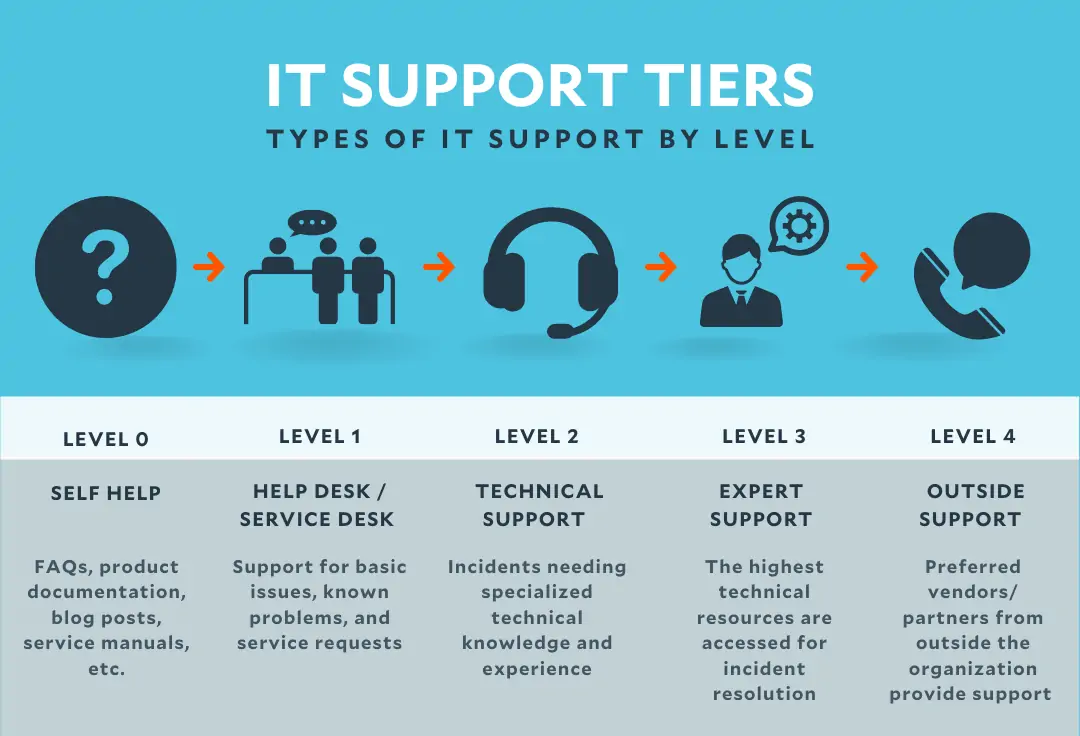
16 Most Important IT Support Roles
It is a growing employment category. No matter their size or type, businesses need IT support. The number of opportunities in this area of work only grows with age. It makes sense why. Faulty IT can sink a business even with the best intentions. Good IT proves critical to any company’s success, even if it doesn’t necessarily operate online or have an online presence.
The most important IT support roles vary from basic and borderline entry-level positions to upper-level management. Let’s learn about their different functions and responsibilities.
Chief Information Officer (CIO)
A chief information officer (CIO) or technology officer (CTO) is the upper-level IT head overseeing all functional areas of the organization’s IT department. They set a strategy for IT infrastructure and set best practices for the company and IT department to follow.
IT Managers
IT managers are one of the most common roles. They often work directly under CIOs for an IT support company. They also oversee the IT department. However, they are more hands-on in hiring, training, and working alongside their IT teammates. IT managers are also called IT directors.
IT Project Manager
IT project managers manage organizational projects, typically guided by strategic plans. They track team progress, establish goals, set deadlines, delegate, and more. IT project managers may also be in charge of non-IT resources and must allocate them intelligently.
Database Administrator
Database administrators organize, maintain, and protect data. They create systems for filtering and ranking data by relevance to different departments or queries.
Data Analyst
A data analyst sorts through business data and analytics to turn data into recommendations or insights for management. They can also help access and filter information, showing whether strategic objectives are being met and what goals to pursue.
System Administrator
System administrators manage and maintain servers, operating systems, and applications. They install, update, back up, restore, and troubleshoot various systems, ensuring their performance, availability, and security are intact.
Cybersecurity Analyst
Cybersecurity analysts protect information systems and data from cyber threats. They monitor, analyze, and respond to security incidents, vulnerabilities, and breaches. Cybersecurity analysts are expected to implement preventative and corrective measures to enhance IT security.
IT Security Specialist
IT security specialists implement protective measures to secure IP and data. They also create contingency plans for hacks or security breaches. As such, they are extremely valuable members of an IT team.
Help Desk Technician
A help desk technician assists customers or users with IT issues related to company services. They offer troubleshooting, answer questions, and address concerns. If they cannot resolve a technical issue, they escalate it to higher-level support staff.
Cloud Engineer
A cloud engineer is an IT support specialist who designs, develops, and deploys cloud-based solutions for a company. Based on the business’s cloud architecture and services needs, they ensure the organization has a scalable, flexible, and cost-effective cloud.
Network Administrator
Network administrators are IT support techs who install, configure, and maintain network infrastructure. They monitor and ensure that a network stays secure, reliable, and efficient and continually meets its users’ needs.
IT Systems Architect
IT systems architects determine how IT services and infrastructure should be built. They often work closely with individuals with software, network, and database expertise to ensure a system the business can use and rely on without issue.
Application Developer
Application developers create custom apps and software for computers, tablets, mobile devices, and other IT. They often help with upgrades to these same applications, perform maintenance tests, and review feedback given to them by users.
Web Developer
Web developers are IT support roles focusing exclusively on a company’s website’s design, appearance, navigation, and content. They manage graphics, applications, and content, ensuring web pages render correctly and providing support services promptly.
IT Auditor
IT auditors evaluate existing IT systems to identify strengths and weaknesses, often in security contexts. The auditor then recommends overcoming weaknesses, resolving issues, and improving a company’s IT infrastructure.
Programmer Analyst
A programmer analyst develops programs and software applications for business initiatives, working alongside project managers and other actors in the IT department. They perform routine maintenance, repairs, and updating existing programs to ensure they meet user needs.



